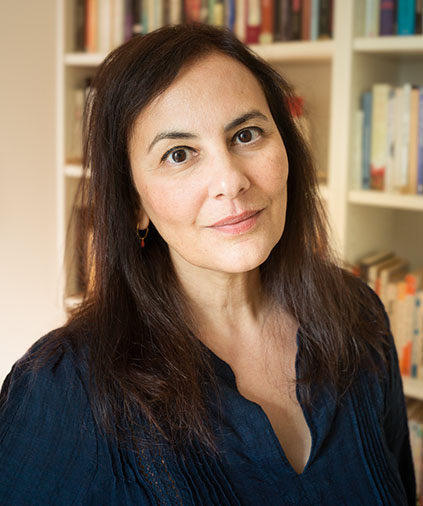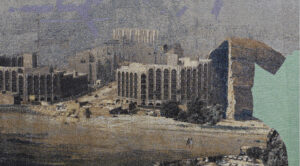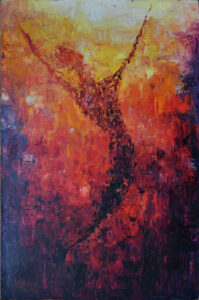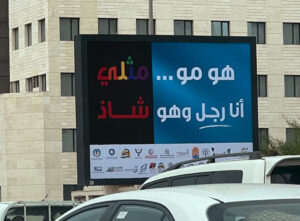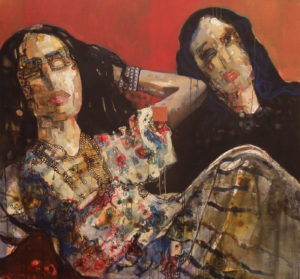
“Naaseha’s Counsel” is a fictionalized portrait loosely connected to Mai Al-Nakib’s recently published debut novel, An Unlasting Home. The novel contains a number of peripheral characters, whose lives captivated their author. Writing short portraits became a way for her to explore them further. Although Naaseha herself does not appear in An Unlasting Home, she would have been part of the context of early twentieth-century Basra described in it. Naeema, a friend of Naaseha’s mentioned here, does appear in the novel as a housekeeper who works for Yasmine (one of the main characters) in Kuwait in 1954. The ages don’t match up, but the name and background do.
As Al-Nakib was researching that Basra context, she came across photos of Africans among the members of households of some of the wealthy families living there at the time. While aware of the underexamined history of slavery in the Gulf region, she didn’t know much about it, and brought up the issue with her father, who grew up in Basra as a young boy. He told her about a woman named Naaseha, albeit recalling only the scantest details, and yet the story haunted her. Al-Nakib says she wrote “Naaseha’s Counsel” as a way to tie some of those details together and to broach this bleak, forgotten history of the region through the humanity of a single voice.
Mai Al-Nakib
“I must have been a year old, maybe a year and a half, when I was stolen off the continent of Africa. I remember nothing of the place we vanished from, my mother, my sister, and I. I’ve been told we landed on Zanzibar first — island with the magical name — and then were shipped off to Kuwait on a dhow pushed up by the monsoon winds, stored like dates and mangrove poles in the lower cabin.
“My earliest memories are scraps of life in Kuwait Town with my mother and sister, their names as veiled as my place of birth. I remember winding alleyways, yellow mudbricks, and the devilish dust. I remember playing in the courtyard of the house that owned my mother. I hear myself laughing with my sister at dawn. She was only a feather taller than me, so she couldn’t have been much older. She untangled my hair with a pink comb. She made tiny dolls out of cloth remnants and stray ribbons. We stared at crawling ants, tracing narrow paths in the sand with our fingers, sometimes leading them in opposite directions from each other. It makes me cry when I think of those poor ants now. I remember two other small children in the courtyard. They played with us sometimes.
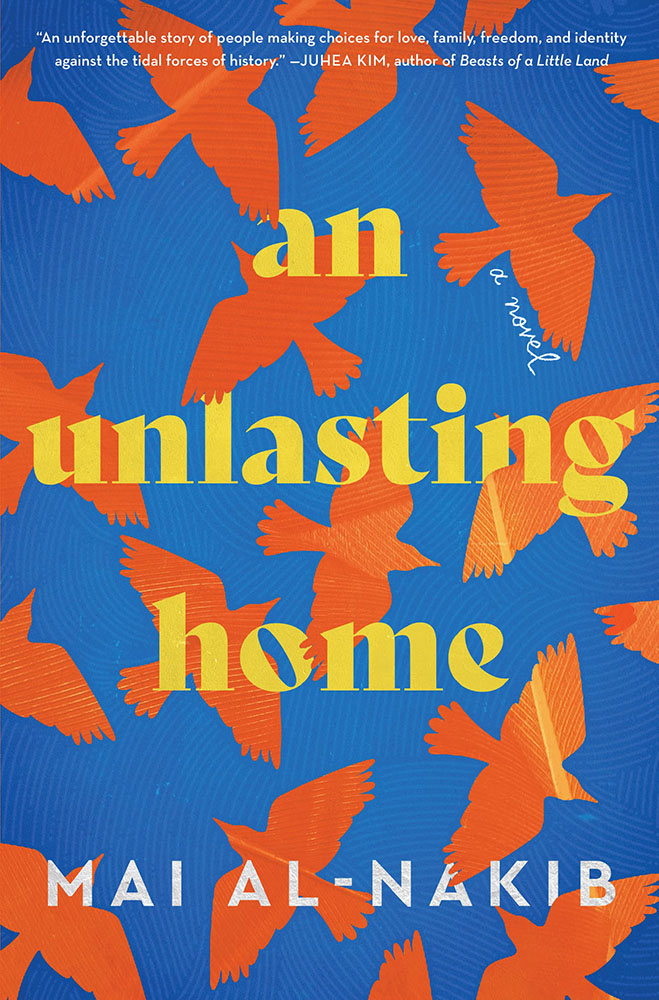
“My mother would seat my sister and me out on the decheh, the mudbrick bench facing the sea that ran along the front of the house. She would order us to stay put. Some days the water was flat as a silver mirror. Other days it raged like angry white soldiers. When the sandstorms blew in, my mother would pluck us off the bench, a child under each arm, and rush back into the house, pulling the heavy door behind her. Cla-cluk was the sound it made. I would bury my face deep in her bosom, fill my nostrils with the smell of her sweat and the rose water she must have sprinkled on her clothes. Her smell blended with the smell of dust in the air. It fills my nose even still, old woman that I am, few teeth left in my mouth. I always believed that smell would lead me back to her.
“It happened one day when my sister and I were outside. It must have been early morning because the sun, not yet overhead, warmed my right cheek. Strong hands lifted me up from under my armpits. Not my mother’s hands. Rough hands with violence running through their veins, nails that pierced through my tattered dress, cutting into my flesh. I screamed as loud as I could. My voice filled my throat and ears. I remember my sister’s round animal eyes and her voice rising up with mine, then drowning it out. I remember darkness, my head bouncing backwards, my soundless, shaky crying. I remember fear wrapping my body like a second skin. I could no longer hear my sister. Did she run inside to call our mother? Did our mother dash out before my sister had the chance to get her? Our mother was never far. Sweeping or cooking or mending things. Or minding those two other children. I always felt her close.
“I don’t remember anything after that. I lived in a rubbed out space for a long time. That blur of forgetting protected me, I think, until I was ready.
“I was about three years old when I ended up a slave in Basra, Iraq, in the palace of the Pasha of that town. From what my family tells me, I arrived in the 1890s, no one is certain of the exact year. When I say my family, I mean the family I belonged to. They bought me, along with two other young girls, from the men who stole us. I was the youngest. I asked my Mama Amina — one of the Pasha’s four wives — why the family had wanted to own me, a useless little girl. She said that they often bought young ones, raised them in the big house, almost but not quite part of the family, so that they would stay loyal. It worked. I’ve been loyal to my family.
“I grew up with the brood of children from the Pasha’s many wives and the young slaves of the house. We played and ate together, spent most of our time side by side. During the flaming afternoons, we swam in the large fountain of what was known as the Slave’s Palace. The Slave’s Palace was not a palace where the slaves lived. It was a leisure house the father of the Pasha had once used as a retreat from Kuwait Town. The Pasha’s old father lived in Kuwait, not Iraq. But when he would come up to Basra, he preferred to stay in the Slave’s Palace rather than in his own. With the prettier slaves, I expect. By the time I arrived, the Pasha’s father rarely visited Basra anymore. We kids had the run of the place during the daylight hours, splashing in the fountain, flying like jinn through the corridors of the building, scrambling up and down the eucalyptus tree in the middle of the large courtyard. With the house children, we were close as buttons, unlike owners and slaves outside our palace. We called it our palace. It was, anyway, a kind of paradise.
“We slaves didn’t go to school with the others, but some of us were schooled at the house by one of the older slaves and sometimes by a religious tutor. The words that came out of Sheikh Ahmed’s mouth calmed my wretched soul, allowing me to rest, for a time, in the grace of destiny. It’s easier to believe in fate than to reckon with the rage of the world. From Sheikh Ahmed I learned to recite the Qur’an, and I learned to surrender to the will of God.
My name, as you know, means counselor. How could they have known when they named me that I would be counselor to many? For whatever reason, they pegged me as wise.
“When the children came home, they would share with us what they had learned at school that day. Khaldoun, my Mama Amina’s eldest son — your grandfather’s oldest brother — taught me how to read. Reading didn’t come easy to me like it did to him, but I loved words and memorized as many of them as I could. Mama Amina, who was Turkish, would say to me, ‘Never you mind, ya Naaseha. Arabic is unforgiving. It doesn’t welcome outsiders like us. You’re better off learning how to sew or cook, skills you can use to keep people close to you. Learn how to make a pacheh they lick their fingers after, and you’ll have these silly pashas eating out of your hands forever.’ She wasn’t wrong.
“My name, as you know, means counselor. How could they have known when they named me that I would be counselor to many? For whatever reason, they pegged me as wise. Even when I was a young chick, members of the family and other slaves would flock to me for advice. I took my role seriously, finding a place in the accidental ideas others had of me. I would listen as long as it took for them to explain their problem. What everyone wants, ya habuba, what each of us is desperate for, is to be heard. I absorbed their worries in silence, bead by bead. They’d ask me what to do about their cheating husbands and nasty mothers-in-law, their naughty children and pesky neighbors. But also, they’d spread before me like a hand of cards their burden of secret regrets. No matter how hard they nagged for a response, I wouldn’t say a thing until one night had passed. Then, the next morning, I would tell them what I believed they should do. Sometimes they followed my counsel, other times they did not. If they didn’t, they’d hit their foreheads with their open palms and moan, ‘Akh, ya Naaseha, we should have listened to you. We should have listened.’
“Mama Amina trusted me with her heart. She insisted I sleep in her room, which I did until she died. She was like I am now, all bones and seldom hungry. But she kept that glint in her eyes until the end. She loved to talk, and she treasured my opinions. We’d back and forth for hours, me rubbing her arms and her feet, which ached like mine do now. Her children loved me, and her grandchildren love me. And now you, ya habuba — great-granddaughter of the Pasha himself — here you are at my bedside, my death so near I can taste it, rubbing my arms like I rubbed hers, asking me to reveal forgotten things. But you’re asking the wrong questions, child, questions as off target as your grandfather’s and granduncles’ questions were, a lifetime ago.
“The Pasha was a frightening man, and he sought advice from no one. He was away often, and we were relieved about that. It was said that if a pregnant slave happened to fall under the Pasha’s black eyes, she would instantly lose the baby. I didn’t witness this myself — no doubt it was an exaggeration — but that didn’t stop us from believing it. His gaze could freeze you in your tracks, make you feel as guilty as if you’d stolen gold from the coffers, and afraid for your life. None of us came to much harm at the hands of the Pasha, but that did nothing to diminish his menace.
“When King Faisal the First was being considered by the British to rule Iraq, he was informed that his royal position wouldn’t be secure unless he had the support of the Pasha of Basra. So, he called on our Pasha to pay his respects. An extravagant dinner was organized. We worked in steaming kitchens for days preparing more food than you could dream possible. The King arrived with his entourage, and we all stood in the gardens to welcome him. We saw our Pasha greet him stiffly, his head tilted, his nose lifted. For the rest of the night, the Pasha hardly said a word. Over dinner he stared at the King with those stormy eyes of his, stone-still in his seat. We could see the King squirming in place as we served course after course of food. The King kept glancing to the left, to the right, desperate for someone to save him. The Pasha didn’t shift his eyes away for a second. As soon as sweets and tea were served, the King made his excuses and scrambled out the door like a frightened gazelle. I think he believed the Pasha was planning to slit his throat after dinner! We laughed and laughed afterwards as we gobbled up the treats our hands had made. ‘Leave it to our Pasha to scare off the King of Iraq!’ We felt proud that night.
“Whispers about the Pasha’s intrigues swirled through the palace, but we didn’t dare utter a word about it. As I’ve said, the Pasha didn’t ask advice from anyone. That’s because he didn’t trust a soul, not even his wives or sons. But one time, and one time only, he asked me. It happened soon after the great triumph of the King’s banquet, shortly before the Pasha’s exile to Ceylon by the British. I was sitting under the calm green of the palms, my feet dipped in one of the cool canals that watered the date plantations. It was a hidden corner I had discovered as a child, a place without people, without much sunlight, ringing with birdsong, and thick with the smell of soil. I returned to that place again and again, collecting, in fragments, my lost memories, looking for something—some thing—that wasn’t there. In over thirty years, I had only ever run into date-pickers scaling the trees with their bare feet, so imagine my shock when I saw the Pasha himself strolling along the edge of the canal toward me. I jumped up, ready to scat, when he put up his hand to indicate I should stay. ‘What’s your name?’
“‘Naa…seha.’ I couldn’t keep the quiver out of my voice.
“‘Naaseha.’ He paused. ‘Are you?’
“‘They say I am, ya Seyyidi al-Pasha.’
“‘What would you counsel me, ya Naaseha?’
“I hesitated. I had noticed something during the King’s banquet that I was sure no one else had, certainly not the Pasha. The King, despite his terror, appeared a man with an expanding future. The Pasha, despite his display of power — no, because of it — appeared a man of the past. How could I express this to the mighty Pasha without dying?
“He must have sensed my reluctance. ‘Say what you will, Naaseha. You are under my protection.’
“‘Ya Seyyidi, I counsel you to beware of false promises.’ The Pasha nodded his approval; he was used to protecting himself against betrayal. Then I took a deep breath and said the thing I really meant to say. ‘And beware your own pride.’
“The Pasha’s eyes narrowed to black slits, and I was sure he was going to strangle me with his hands. Instead, after a second or two, he threw back his head and roared. He patted me gently on the shoulder and continued on his way.
“Many of the slaves in Basra owned by other wealthy families, when asked in the street who they belonged to, would give the name of the Pasha’s family, even though it wasn’t true. This continued even after the Pasha was dead, when slaves were bought and sold no more. We kept our family’s name, even after we didn’t belong to them. What choice did we have? I don’t know who my real father was. Was he stolen from our homeland with us? Did he sell us himself? That happened sometimes. Desperation forces unspeakable things. I don’t blame my father, not anymore. I choose to believe my father was a slave like us and that our family was separated in Zanzibar. This was a story worn thin from retelling by other slaves in our big house. It may as well be my story too. My poor father. My poor, poor mother.
“Some of the slaves purchased by the family as children didn’t remember anything about their mothers or fathers or siblings. I was lucky. I may not have been able to bring to mind a single detail about my father, but I still carried my mother’s smell and my precious sister’s scream in the dazzling light. I could still feel my mother’s heart thudding against my small chest as I slept curled against her. Sometimes I would wake up with the ghost of my sister’s fingers wrapped around my own. I was luckier than many who remembered nothing at all. A hollow gap in their hearts and minds in place of their own flesh and blood.
“But even with these diamonds tucked in my soul, fear suffocates me, and it feels like I’m drowning in the Shatt. Nightmares choke me awake in the middle of the night, even still, when time should have healed those wounds. I promised so many mothers who lost their children and so many children who lost their mothers that time would ease their pain. I wasn’t lying. Time heals, but not everything. Not the anguish of being stolen from your unknown land and father. Not the horror of being ripped from your only mother and sister. The passage of time interrupts and it distracts, but it can’t heal that.
“I grew up with Mama Amina’s boys. They were my brothers. They knew my sorrows. When we were young, they used to beg me to tell them the story of my second abduction. ‘Do you remember seeing his face, Naaseha? Did you see his nails or just feel them on your skin? Why did your mother leave you outside? Do you think he threw you in a burlap sack? What did it smell like? Why don’t you remember anything after that?’ And on and on they would go. To them, it was a pirate’s adventure. To me, it was walking through fire.
“As we got older, they asked about other details, like you do now. What did my mother look like? How old was my sister? Describe the house. Describe the view from the bench. Did I remember anything at all about the location? They probed and probed till I pushed them away, exhausted and frightened, tears in my eyes. They would send word to Kuwait. The family had many contacts there. Who were the men who stole the children of slaves? In a small town, surely the identity of these bandits would be common knowledge. But every reply to their inquiries was another disappointment for me. After the tenth disappointment, I decided to go see for myself. That’s when I asked for the first trip to be arranged.
“It was just before the start of the first great war of the foreigners. I must have been in my early twenties. I asked Mama Amina if one of her sons would take me to Kuwait Town. I believed that if I could wander the alleys for myself, I would locate my missing mother and sister. I was certain they would be in the same house. I was convinced I would recognize the bench facing the sea. Although I was only around three when I last saw it, my dreams of that moment were as clear as desert rain. I was certain I could find the house. Mama Amina spoke to her eldest son, who planned my first trip back to Kuwait in twenty-odd years.
“We arrived by sea and everything looked new. I recognized nothing of the old town. All the images in my head shattered into a thousand pieces, and I cried because without those images, I had nothing. Khaldoun put his arm around me and told me not to worry. We walked through the firjan, alley by alley, from Sharq to Jibla, until the sun set. We spent the night at the Pasha’s father’s home, and early the next morning, we set out again. All the seafront houses, one by one. All the houses perpendicular to those along the shoreline. Khaldoun knocked on every door. He went down to the docks to inquire about a slave woman and her daughter. It was an impossible question. ‘Do any of you know of a slave mother and her daughter who lived in a house with a decheh over two decades ago? Do you know the men who stole the children of slaves?’ I was surprised they didn’t laugh in his face. Every time a door opened and Khaldoun asked the question, I held my breath, filled with sun-bright hope. That hope didn’t fade, no matter how many times the answer came back ‘No.’ I could have gone door to door for weeks, even years, but after a few days of searching, Khaldoun decided it was time to return to Basra. I didn’t have a say in it.
“For ten years after that first visit, I mapped those alleyways in my mind, convincing myself that if I could walk through them one more time, I would find her. We must have missed the one home, tucked away on some neglected lane, where they would have remembered her, my beautiful mother. I asked for another visit and, once again, the family obliged. On this return I could see that the people of Kuwait Town were suffering. Starvation in the streets, the once lively ports dead. It was 1924, not a good year for them. Things were heating up in Iraq too, those British troublemakers behind most of it. They exiled our own Pasha and, a few years later, rumors would circulate that they were responsible for his death. My advice, even if he had heeded it, would have had no effect against those tricky foreigners. But meskeena Kuwait, Khaldoun told me, was being squeezed by the British, by Ibn Saud, and by pearls that didn’t come from the sea. ‘Along three fronts, Naaseha. Can’t be easy for them.’
“I had no luck finding my mother or my sister this time, either. Khaldoun and I traced all the dirt paths on foot, losing ourselves in the maze of the firjan. The winding neighborhood alleyways and mudbrick homes were dizzying, especially at twilight, and they didn’t shelter any sign of my kin. The questions Khaldoun asked residents made even less sense to them than before. Many of the ones who may have remembered something were, by then, deep in the ground. To those left, the past was a smudge on the horizon. Putting food in the stomachs of their children mattered more than the distant woes of a motherless slave. This time, I was the one to say we should go. It was no use. My hope, no longer bright, collapsed into a dank well, collecting rot.
“The third time I returned to Kuwait, I stayed. It was 1954. By then I was over sixty. Mama Amina’s sons decided to move there for good. Mama Amina was dead, Allah yarhamha. It was a sad leave-taking from Basra. The children and grandchildren of the Pasha considered Basra their home, and so did I. We didn’t know what we were getting ourselves into. But as it turned out, those boys, my brothers, knew what they were doing. The revolution would come to Iraq soon enough, and meanwhile, Kuwait had discovered oil.
“There was little hope of finding my mother or my sister. Yes, I knew that my mother was likely buried by then, maybe my sister too, but I couldn’t help feeling relieved at the chance to search to my heart’s content for the rest of my life. You see, ya habuba, that was the real knot for me. Not who the men were. Not the stain of stolen children, who knows how many. Not the things that bothered your granduncles and grandfather, the guilty things that seem to trouble you. It was my mother and sister I wanted back, with the greed of a nursing baby. My mother and my sister and the time lost between us — stolen, broken time.
“I was no longer a slave. None of us were owned anymore. We were permitted to remain in the family home if we chose to or the family would find us small places to live. Some of us stayed, others, those with real families of their own, decided to move on. I had never married, so I stayed. I gave good advice, a wise old owl. But I wasn’t beautiful and couldn’t shake my fear of men’s hands. I raised many children, but I had no children of my own. I was convinced my pain would pass through the blood to any I carried in my womb. I didn’t want to risk transferring to my own child the misery of what had been done to me. All those years I had been left alone by the men of the family, a rarity among the female slaves. Out of respect for Mama Amina, I suppose. My two closest friends, Naeema and Naseema — the two they bought as children along with me — weren’t as lucky. I never asked who had named us. It must have amused someone to give three little slave girls names beginning with the same letter. It was the kind of thing that happened, small jokes at our expense. Joke or not, our names bound us together. They couldn’t replace my own sister, but those two loved me fiercely. They are long dead, my oldest friends, but their children live on. I discovered no trace of my mother or sister, even after three decades of searching, and no one lives on after me.
“I dream of them every night, and in my dreams we are together on the island of Zanzibar. A humid breeze skims my forehead. Blue water of a shade that doesn’t exist on earth shimmers before us. I am almost with my mother now, and my sweet, sweet sister, and the smell of roses surrounds us.”
Afterword
I am in no position to express the depth of Naaseha’s intolerable experience, and so I attempt to bear indirect witness to it instead. She was only three when she was stolen, but the fact that she remembers as many details of that traumatic event as she does suggests it has shaped every aspect of her being. The violence of that trauma combined with her complete inability to seek redress—first as a child, then as a female slave—is compounded, such that her expression of grief is not conventional. Wandering the Kuwaiti firjan in search of her mother and sister is a form of mourning. The fact that she doesn’t want to have children so that she doesn’t pass down her pain to them through the womb is another shape her sorrow takes. And her recurring dreams, even as an old woman, express her unspeakable loss. The fact that Naaseha manages to live among her captors, to carve out a life for herself, is, perhaps, her way of managing her grief the only way she can given the horrific circumstances.
Naaseha is speaking to the great-granddaughter of the Pasha, who also makes an appearance in my novel. An Unlasting Home is, in many ways, a repository of women’s stories collected by Sara, the protagonist. The listener in “Naaseha’s Counsel” is unnamed, but as I was writing it, I must have imagined her to be the young Sara, gathering yet another woman’s story otherwise lost to oblivion. —Mai Al-Nakib



